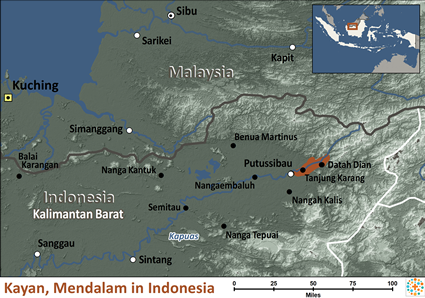The Mendalam Kayan live in the Indonesian portion of the island of Borneo, near or on the Kayan River.
Traditionally, the Mendalam Kayan lived as nomadic hunter-gatherers, fishing, hunting, and practicing slash-and-burn agriculture. In the early 20th century, the Kayan began to settle down, living in villages near navigable rivers. The Dutch colonial government encouraged this move to a more stationary lifestyle.
For many years the Kayan lived in constant conflict with other tribes, especially the larger Iban. The Dutch brought an end to the cycle of violence and revenge for the most part.
The lives of the Mendalam Kayan are changing. Traditionally, they lived in long houses on the banks of rivers. These long houses would serve as shelter for up to 50 families. The chief's room was in the middle of the long house. Now most Mendalam Kayan people live in single-family dwellings and some have moved to cities and to the coast in search of a better life.
The Mendalam Kayan grow dry rice (planted in dry ground rather than in paddies) and corn as their main foods. They also raise animals like chickens, pigs, ducks, and cattle. Hunting and fishing remain as mainstays of their economy. Their men hunt animals with blowguns with darts tipped with poison. Kayan women are known for weaving colorful cloth made of cotton.
Unlike many Indonesian tribes, the Mendalam Kayan have not adopted Islam as their religion. They practice an ethnic religion deeply rooted in their identity. Each village has a shaman who is reputed to have powers to connect with the spirit world and with ancestors. The shaman also serves as physician and village priest. He casts magic spells and performs rituals to appease the evil natural spirits who inhabit the spirit world.
Christianity has reached many of the non-Muslim tribal peoples of Borneo. The Kayan, however, still practice their traditional folk religion, shamanism and veneration of ancestors. No Christian resources currently exist in the Mendalam Kayan language.
The Mendalam Kayan need teachers and schools for their children, help in learning new job skills, and access to modern medicine. Most of all, they need to hear and understand the message of Christ who can free them from their fear of evil spirits and grant their forgiveness of their sins.
Ask God to release the Mendalam Kayan from their fear of evil spirits.
Pray for translation of the New Testament into the Mendalam Kayan language and for God to make their hearts receptive to the truth of scripture.
Ask God to raise up workers and send them to the Kayan to share the gospel and to improve their education and job training.
Pray for a movement to Christ among the Mendalam Kayan that will result in disciples and churches that multiply through generations.
Scripture Prayers for the Kayan, Mendalam in Indonesia.
| Profile Source: Joshua Project |

























